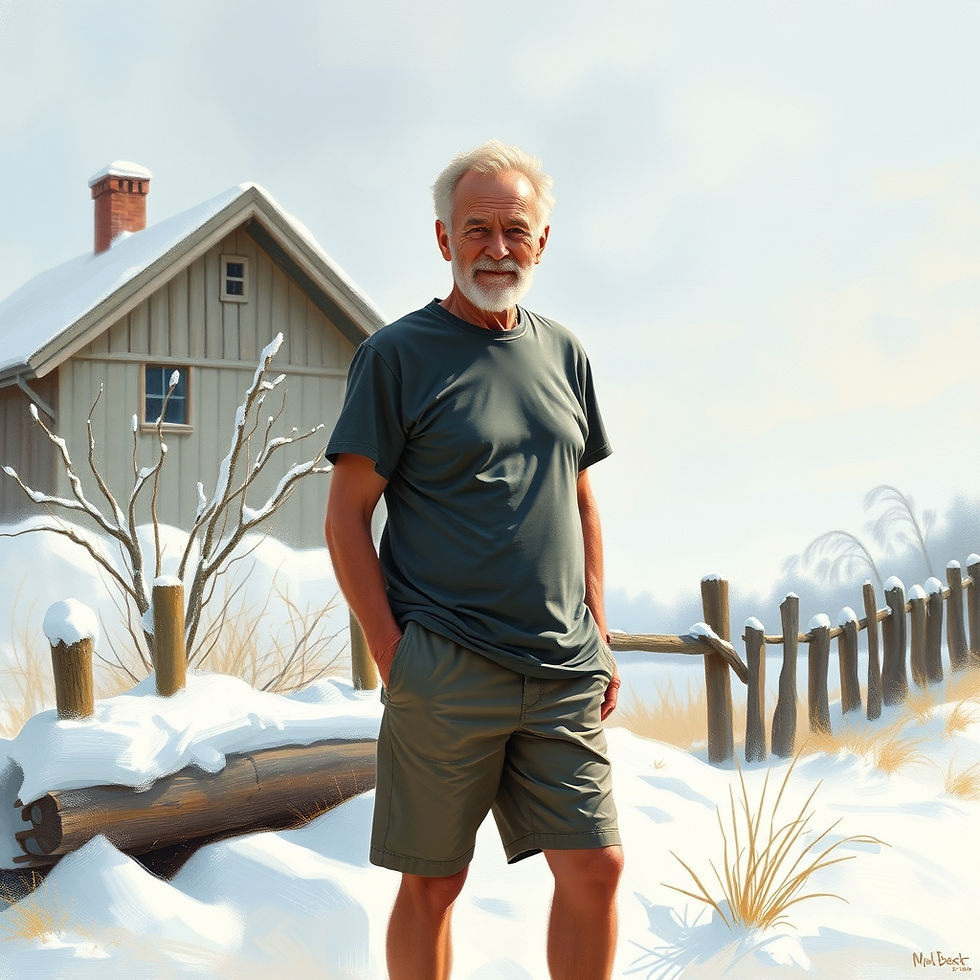"Survival of the Kindest": Why It is So Dang Hard; A Cartoon to Help, Some Seeds to Plant, and a Rule to Follow (For Jimmy and Me and Maybe You)
- drjunedarling1
- Aug 27, 2025
- 4 min read
Those communities which included the greatest number of the most sympathetic members, would flourish best. – Charles Darwin

"Ol farmr" (as his license plate says) Randy Smith responded in an incredibly unusual way to the terror of September 11th. Randy didn’t choose fight, flight, or freeze. He chose something else — to farm. Not just crops, but relationships. Over the years, Randy patiently cultivated trust with people in Central Asia, especially Kyrgyzstan, planting peace where others might have planted fear. I wrote about this in the previous blog.
As humans, homo sapiens, we have many behaviors available to achieve our needs and longings, to protect ourselves, to survive and thrive. But one response is usually a far better choice both personally and collectively...in the long term.
Let me show how this works in a real story of my teen friend. I’ll call him “Jimmy”.
Jimmy wants to belong, just like the rest of us. But sometimes he falls into the trap of selfishness. He shows up empty-handed to the marshmallow roast and still eats more than his share. Or, when teased at recess, he clenches his fist instead of opening his hand.

For a moment, selfishness and aggression feel like wins. He gets the s’more. He feels powerful with the ball. But soon the laughter dies, trust erodes, and Jimmy is left out.
Why? Because kindness, not selfishness, is what sustains groups over time according to many researchers. I’m putting all this together in my own mind having just recently browsed through, Pulitzer prize winner, E.O. Wilson’s book, The Social Conquest of Earth.
Here is how Wilson and other thinkers line up when it comes to kindness and cooperation and thriving. You may be surprised to read what Darwin actually wrote (unless you paid attention to the opening quote)… along with some others.
Darwin: contended that tribes rich in sympathy and compassion flourished best.
Margaret Mead said the first mark of civilization wasn’t a spear or tool, but a healed femur — evidence that someone had been cared for.
E.O. Wilson explained why selfishness can work in terms of getting more of your share in the short run, but altruistic groups always outlast selfish ones.
Dacher Keltner first coined the phrase, “survival of the kindest.” According to him, we are wired with compassion, awe, and gratitude because those emotions glue communities together.
Adam Grant found that in workplaces, givers build the deepest success. Takers may rise fast, but they crash. Givers (with boundaries to protect them from over-giving) sustain trust, innovation, and joy.
Here’s what I see going on with my young friend, Jimmy. When he forgets to give, or swings his fist, he’s listening to the “selfish gene” whisper: take care of yourself first. And when he responds to that, he loses his biggest desire – to belong and be trusted, to have friends.
But when he shares the ball, or washes the dishes, or says “I’m sorry,” he steps into the long story of human survival: kindness, sympathy, cooperation. And he finds that others want him to be part of their group. Others want him for a friend.

Randy discovered the value of this response on the world stage after 9/11. Jimmy is discovering it on the playground. And both remind us: the long-term winners in life are not the fighters, hoarders, or takers, but those who tend, share, and cultivate peace.
Here’s Three Seeds to Plant and what Jimmy — and all of us — can practice:
Bring Something. To the fire, to the game, to the conversation. Don’t just take; contribute. In these distracted times, bringing our attention can be highly valued as much as a thing (and don't take more than others who have needs and wants as well). And bring something of yourself, your authentic self. If it feels right, self-disclose, bring a bit of vulnerability and humility as well.
Pause the "Fist". When anger rises, wait. It's so very tempting to fire back. Think of what is likely to be the response of the other to your snide comment or rudeness. Remember that escalation weakens everyone in the long run.
Farm, Don’t Flee. Cultivate patience, relationships, and trust — even when it’s slow.
The lesson is simple but hard to live sometimes: selfishness may seem so sparkly for a moment, but kindness sustains the giver, the group, and the globe.
Jimmy’s story reminds us what Randy’s story already taught: when the world shakes us with fear or shame or anger, we are not limited to fight, flight, or freeze. We can choose something better for us all. We can choose to farm kindness.

How might we journey together to the Good Life by remembering survival of the kindest and choosing to farm?
My artist friend, Dan, "the Art Man" McConnell helped me to tell this story through his drawings. I’m hoping my friend, Jimmy, along with me, lets the images and the message seep into the bones.
















And where does Wilson (despite being an atheist I presume...taking a clue from reading his book)finally end up after all his meandering through anthropology, biology, sociology and philosophy? By promoting the rule which most encapsulates what we must all practice to survive and thrive as homo sapiens? Do Unto Others As You Would Have Others Do Unto You. Where have we hard that before?



Comments